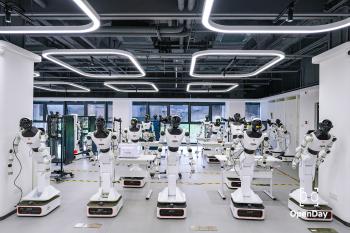Siemens publishes Infrastructure Transition Monitor 2023
06.12.2023 - According to the study, only 37% of companies in Germany, Austria and Switzerland expect to achieve their decarbonization goals by 2030
Siemens Smart Infrastructure has published a report entitled “Siemens Infrastructure Transition Monitor 2023: The Great Divide on The Path to Net Zero” that provides important insights into the debate about infrastructure change1. The report shows that there is agreement among citizens, companies and authorities that the energy system must be reformed for a resource-efficient and decarbonized world (46 percent DACH region). While more than half of those surveyed believe that infrastructure change is accelerating in the DACH region and their country has an effective decarbonization strategy (64 percent), only 37 percent of surveyed managers in Germany, Austria and Switzerland believe that the climate goals be achieved for 2030. Viewed globally, this survey figure is significantly higher at 44 percent. As a result, only 28 percent in the DACH region see the process of change as agile. In a global comparison, however, the DACH region is more optimistic at 62 percent that the climate goals for this year will be achieved (globally 40 percent).
Matthias Rebellius, Member of the Board of Management of Siemens AG and CEO of Smart Infrastructure, says: “Infrastructure change is accelerating and putting systems worldwide under pressure – from energy to mobility to buildings. The further development of global infrastructures is of paramount importance to enable progress in the areas of decarbonization, resource efficiency and social well-being. Technology and digitalization are crucial to making this change intelligent and sustainable. At Siemens Smart Infrastructure, we have already taken the first steps and developed innovative products, systems, solutions and services to support the current and future challenges of urbanization and climate change.”
The aim of the study was to assess the current state of infrastructure change, including developments in the systems, services, buildings and structures required for the effective functioning of industries, cities and countries. The data was collected in a global survey of 1,400 managers from 22 countries as well as in-depth interviews with managers and experts. The numbers and statements here focus on the DACH region with 100 people surveyed.
The study is based on the conviction that infrastructure change must not only lead to decarbonization, but should also have positive effects beyond that. The report also assumes that better integration of infrastructure is essential to bring about change. Ultimately, urgent and urgent measures must be taken to avert catastrophic consequences – both global and local.
In the long term, change is not occurring quickly or agilely enough at the regional (country) level
Despite the acceleration of infrastructure change, greater progress is required at the regional (country) level to reduce CO2 emissions quickly enough. The energy sector is a particular priority, as almost three quarters of global greenhouse gas emissions come from the production, use and transport of energy. According to McKinsey2, decarbonizing the world's energy systems would require around $275 trillion to bring about profound changes in electricity production, distribution and use. The greatest responsibility is attributed to the regulatory authorities in the DACH region (30 percent of those surveyed), followed by the actual owners of the tangible assets, the investors/shareholders (24 percent). According to those surveyed, companies and citizens (each with 15 percent) and politicians (14 percent) also have a certain responsibility, but it is significantly lower.
Cities play an important role in combating climate change. According to the survey, over half of respondents (61 percent) believe that being ahead in decarbonization is a competitive advantage for a city. Decarbonizing mobility, including public transport networks and commercial and private vehicles, is a high priority when it comes to reducing emissions. 55 percent of respondents believe their cities have made progress in encouraging the use of public transportation. According to the study, 57 percent also believe that digitalization will help the public transport network to be less fragmented. In terms of a viable mobility policy, 50 percent of executives believe that electric cars should be made more cost-effective than internal combustion engine vehicles through subsidies or tax credits. The biggest obstacle to the widespread adoption of electric vehicles is currently the lack of charging infrastructure.






